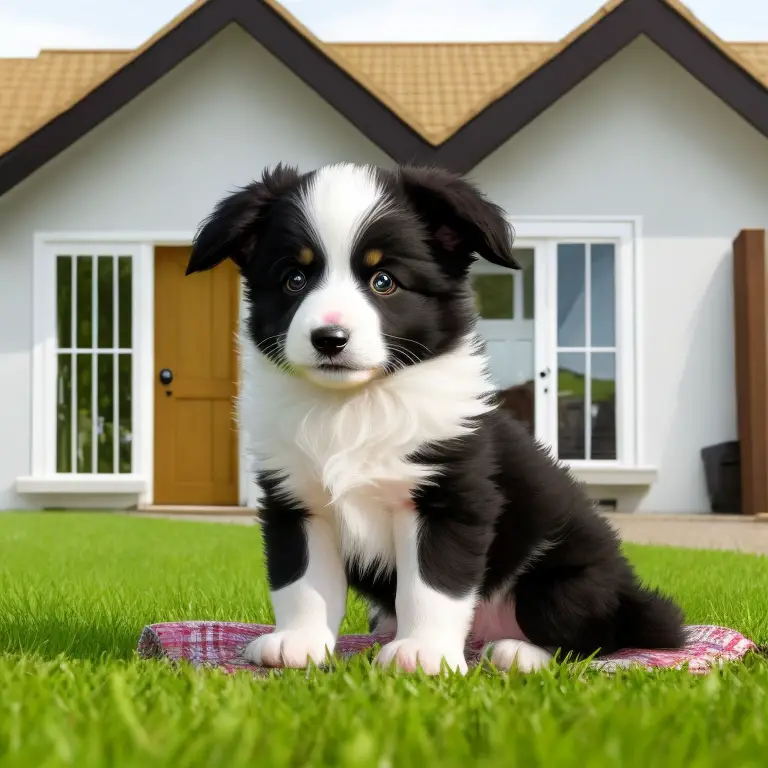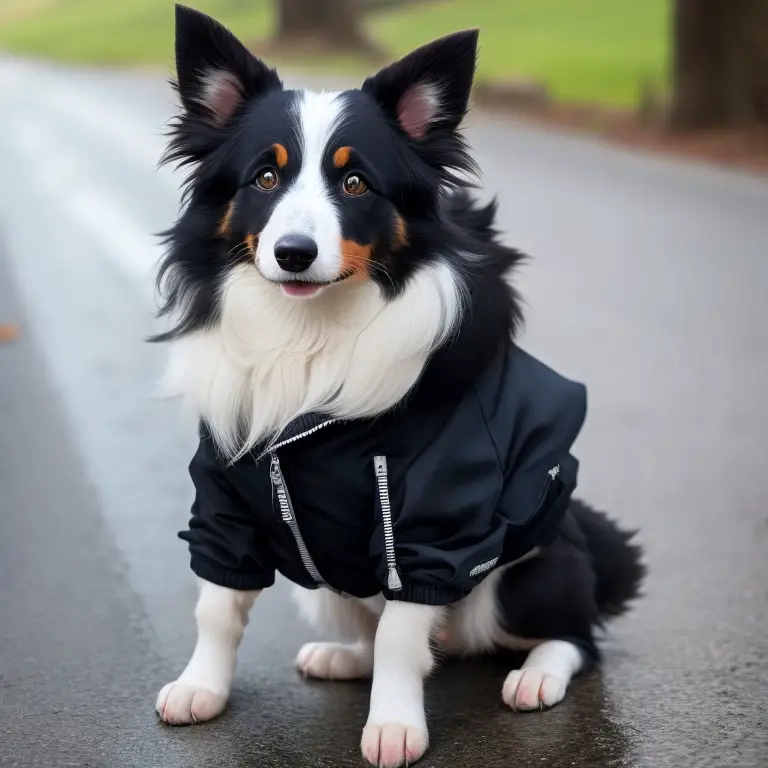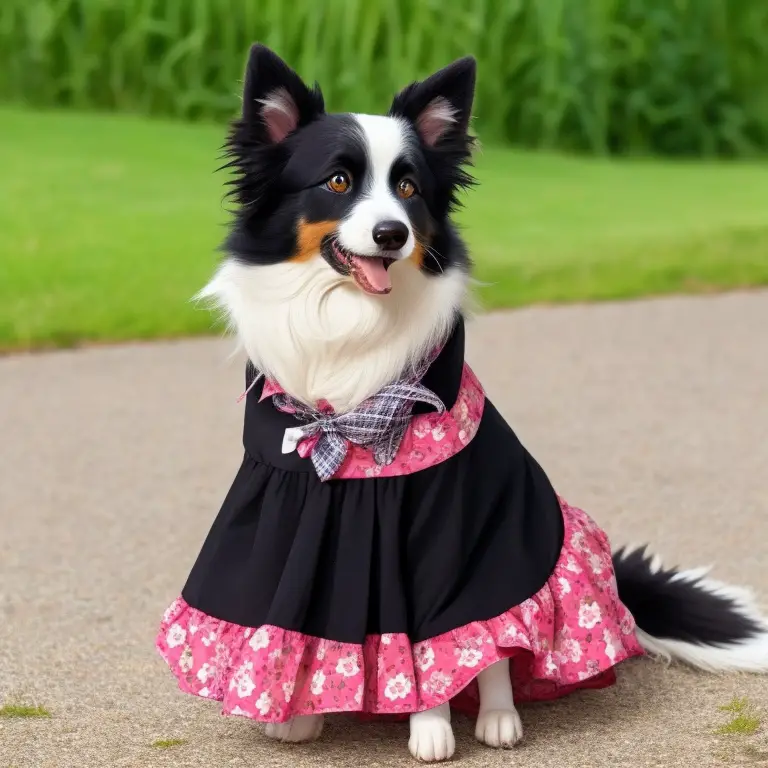Are Border Collies Suitable For Homes With Elderly Individuals?
Are you an elderly individual looking for the perfect furry companion to keep you company and give you joy in your golden years? If so, choosing the right breed of dog is essential to ensure a happy and healthy relationship.
Border Collies are a popular choice among dog lovers, thanks to their intelligence, energy, and affectionate personalities.
But are they suitable for homes with elderly individuals? In this article, we’ll explore the characteristics of Border Collies, the pros and cons of owning one for senior citizens, and alternative low-maintenance breeds to consider.
Read on to discover if a Border Collie is the right fit for your lifestyle.
| Criteria | Yes | No | Maybe |
|---|---|---|---|
| Energy level | High exercise needs | Not suitable for sedentary lifestyle | May be manageable with daily walks |
| Size | Medium-sized, easier to handle than large breeds | May be too large for some elderly individuals | Depends on individual’s physical capabilities |
| Trainability | Highly trainable and intelligent breed | May require more effort and patience from elderly individuals | Depends on individual’s experience and ability to train |
| Temperament | Friendly and affectionate dogs | May be too demanding for some elderly individuals | Depends on individual’s preferences and lifestyle |
| Health concerns | Generally healthy breed, but may develop joint issues | May be a concern for some elderly individuals | Depends on individual’s ability to provide appropriate care |
Characteristics of Border Collies
Physical Characteristics
Border Collies are medium-sized dogs that can weigh anywhere between 30 to 55 pounds and stand at a height of 18-22 inches at the shoulder. They have a distinctive double coat that is thick and weather-resistant, with a soft undercoat and a dense outer coat that comes in a variety of colors, including black and white, tricolor, red and white, and blue merle.
Their overall appearance is athletic and agile, with a strong muscular build that allows them to perform high-intensity activities like running, jumping, and herding for extended periods.
Border Collies have expressive, almond-shaped eyes that range in color from brown to blue, and their ears are medium-sized and pointed, often standing upright or semi-erect. In summary, Border Collies have a distinct look and are considered medium-sized dogs with strong muscular builds, a distinctive double coat, expressive eyes, and pointed ears.
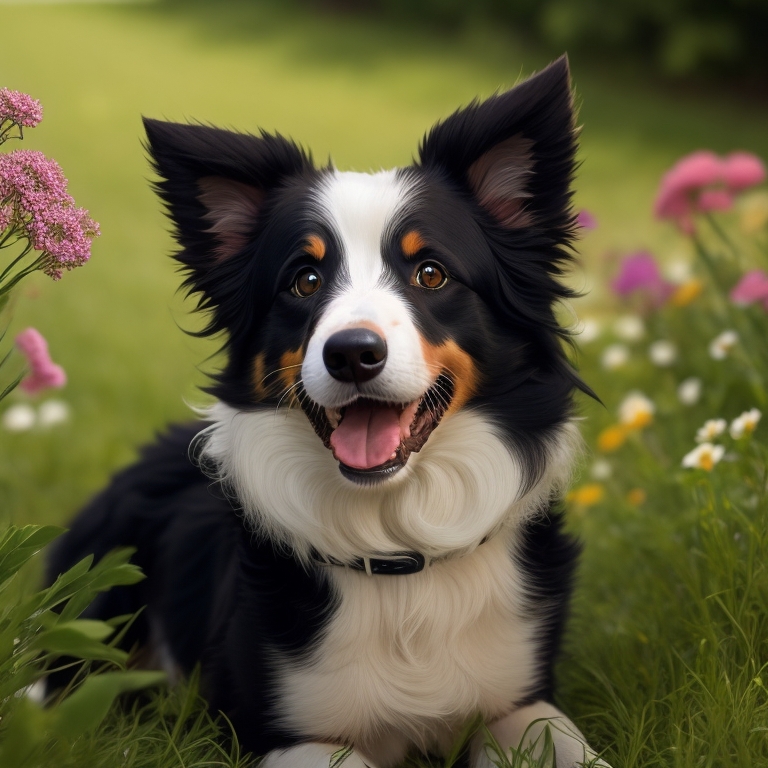
Temperament
Border Collies are known for their energetic and intelligent temperament. They are highly trainable and love to work.
However, this breed requires a lot of exercise and mental stimulation to thrive.
If not given proper exercise and stimulation, Border Collies can become destructive and have behavioral issues, such as excessive barking and biting. Therefore, they may not be suitable for elderly individuals who cannot provide enough mental and physical stimulation for their dog.
Additionally, Border Collies tend to have a strong herding instinct, which may make them prone to try and herd small children or other animals in the house.
Despite their high energy and herding instincts, if properly trained, Border Collies can be great companions for elderly individuals who are willing to invest time and energy into their pet’s exercise and mental stimulation needs.
Exercise and Training Requirements
Border Collies are an energetic and active breed that require a significant amount of exercise and training. They need at least an hour of intense physical activity every day, and mental stimulation is also essential for their well-being.
Their high energy levels can make them challenging for some elderly individuals to keep up with.
Still, if you’re committed to owning a Border Collie, it’s vital to ensure that you provide them with the necessary exercise and training to prevent behavioral issues and keep them happy and healthy. Training is also essential for Border Collies.
They are intelligent and highly trainable breed, and they thrive on being mentally stimulated.
Regular training sessions with positive reinforcement can help to channel their energy in a productive way, and it will also help to build a strong bond between the dog and their owner. Overall, Border Collies require a significant amount of exercise and mental stimulation, making them more suited for active owners and families.
If you are elderly and thinking of getting a Border Collie, it’s crucial to consider if you can keep up with their exercise and training needs.
Grooming Needs
Border Collies have a double-layered coat, which means that they shed seasonally throughout the year. They require regular grooming, which includes brushing at least twice a week to prevent matting and tangling of fur.
Baths should only be given when necessary, as frequent bathing can strip their coat of natural oils, leaving their skin dry and irritated.
Longer hair around the ears and paws should also be trimmed regularly. Their nails should be clipped monthly to avoid overgrowth, and their teeth should be brushed two to three times a week to prevent dental issues.
Overall, Border Collies require moderate grooming, and their routine care is essential to maintain their health and hygiene.
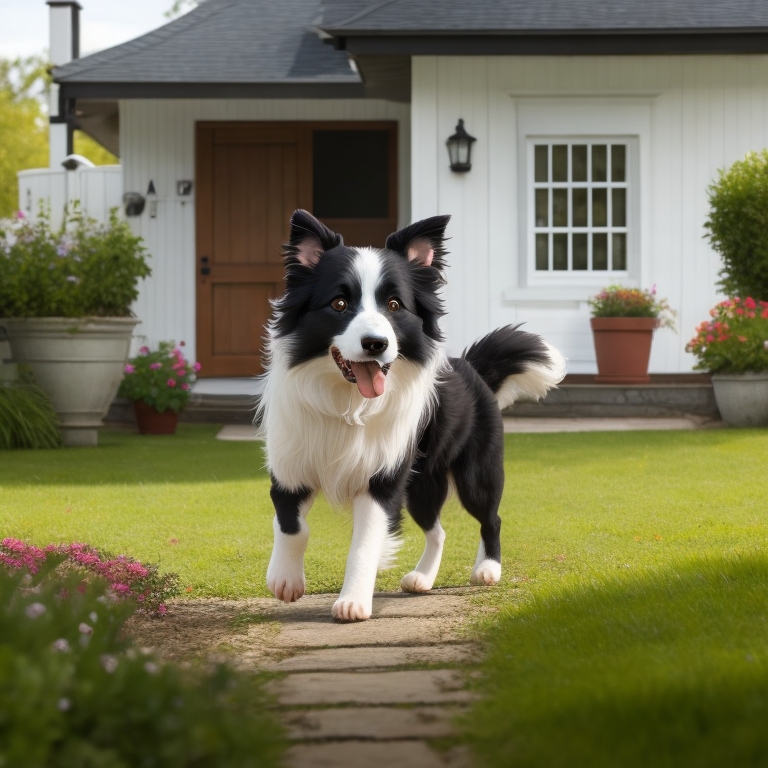
Can Elderly Individuals take care of Border Collies?
Pros and Cons of owning a Border Collie for Elderly Individuals
When it comes to owning a Border Collie as an elderly individual, it’s vital to weigh the pros and cons before making a decision. Here’s what you need to consider: Pros:
- Border Collies are highly trainable and intelligent dogs. They can pick up new commands quickly and are eager to please their owners.
- These dogs are energetic and require regular exercise and playtime, which can encourage seniors to stay active and healthy.
- Border Collies are loyal and make excellent companions, providing seniors with much-needed love and companionship.
Cons:
- Border Collies are high-energy dogs that require a lot of exercise and mental stimulation. Elderly individuals may not be able to meet the demands of a Border Collie’s exercise needs.
- Training a Border Collie requires patience and consistency. It may be challenging for seniors who are not as physically or mentally able.
- Grooming a Border Collie can be time-consuming and requires regular maintenance to keep their coat clean and healthy.
In summary, while Border Collies can make wonderful companions, they may not be the best fit for every elderly individual. Before making a decision, consider the demands of the breed and whether you can provide for their needs.
Factors to consider before getting a Border Collie
Before deciding to bring a Border Collie into a home with elderly individuals, it’s essential to consider the following factors:
- Energy levels: Border Collies are high-energy dogs that require a lot of exercise and mental stimulation. Can the elderly individuals consistently provide the necessary exercise and playtime?
- Personal mobility: If the elderly individual has limited mobility, they may struggle to keep up with a Border Collie’s exercise requirements. Are there other individuals available to assist with exercise and playtime?
- Training: Border Collies are intelligent but require consistent training. Are the elderly individuals ready and able to devote the time and effort required to train a Border Collie?
- Grooming: Border Collies have long, thick coats that require regular grooming. Are the elderly individuals able to groom the dog themselves, or is there someone else available to assist with grooming?
Considering these factors carefully will be necessary before deciding to bring a Border Collie into a home with elderly individuals.
Elders living alone vs elders with company
Elders living alone and elders with company can both take care of a Border Collie, but there are some things to consider. If an elderly individual lives alone, they may have more time to devote to the dog’s exercise and training requirements.
However, if they need to travel or become ill, they may struggle to find someone to care for the dog.
On the other hand, if the elderly individual has company, the responsibility of caring for the Border Collie can be shared. This can be beneficial for both the dog and the individual’s socialization needs.
However, it is important to ensure that everyone in the household is committed to the care and attention that the Border Collie requires.
Overall, it is possible for elderly individuals to take care of a Border Collie as long as they fully understand and are able to commit to the dog’s needs and requirements.

Alternatives to Border Collies for Elderly Individuals
Low Maintenance Breeds
If Border Collies seem too high maintenance for your lifestyle, there are plenty of low maintenance breeds suitable for elderly individuals. Some examples include:
- Chihuahua – small and easy to take care of.
- Pug – affectionate and requires minimal exercise.
- Bichon Frise – friendly and adaptable to different living spaces.
- Bull Terrier – loyal and low-maintenance grooming needs.
- Greyhound – calm and content with short bursts of exercise.
When it comes to low maintenance breeds, it’s essential to consider your living situation and personal preferences. While all these breeds are relatively easy to care for, they still require attention, exercise, and playtime.
Consider your daily routines and activity levels before choosing a furry companion.
Overall, there are plenty of wonderful alternatives to Border Collies for elderly individuals looking for a low maintenance breed. By researching and considering your needs, you’ll find a loyal companion who can provide love, companionship, and minimal hassle.

Characteristics of low maintenance breeds suitable for elderly individuals
Looking for low maintenance breeds suitable for elderly individuals? Here are some of the characteristics you should consider:
- Small to medium-sized dogs: Breeds like Chihuahuas, Pugs, and Boston Terriers are ideal for seniors as they require less space and can be easily handled.
- Low energy levels: Dogs that require minimal exercise such as Shih Tzus, Bulldogs, and Basset Hounds are perfect for seniors who may not have the energy or physical ability to keep up with a high-energy dog.
- Minimal grooming needs: Dogs with short coats or hairless breeds such as Whippets, Mexican Hairless Dogs, and Chinese Crested Dogs are easy to groom and maintain.
- Mild temperament: Breeds with a calm and gentle disposition like Greyhounds, Cavalier King Charles Spaniels, and Beagles make great companions for the elderly.
- Easy to train: Breeds such as Poodles, Basenjis, and Maltese are intelligent and easy to train, making them suitable for seniors who may have limited mobility and strength.
Overall, senior citizens should look for breeds that are low maintenance, easy to train, and have a calm demeanor. These characteristics ensure that the dog will be less stress-inducing and require minimal care, making it easier for the elderly to care for them.
Tips for taking care of a Border Collie – for the elderly
Finding a suitable dog walker
For elderly individuals who own Border Collies, finding a suitable dog walker can be a great help. It ensures your furry friend gets the appropriate amount of exercise they need daily.
However, it is essential to find a reliable and trustworthy dog walker to avoid any unfortunate incidents.
Here are some tips on finding a suitable dog walker for your Border Collie:
- Ask for recommendations from family, friends, or your veterinarian.
- Look for professional dog walking services that are licensed, insured, and well-trained.
- Schedule a meet and greet with the dog walker and your Border Collie to judge their compatibility.
- Discuss your expectations and preferences with the dog walker, such as the duration of the walk, destination, and daily routine of your pet.
- Check the reviews and ratings on online platforms to ensure the credibility of the dog walking services.
Remember, finding a suitable dog walker is crucial for the well-being and overall health of your Border Collie, so invest your time and effort in finding the best option.

Scheduling appropriate exercise and playtime
As a Border Collie owner, it’s crucial to schedule appropriate exercise and playtime for your furry friend to keep them both physically and mentally stimulated. This becomes even more crucial when the owner is an elderly individual.
For a Border Collie, exercise is not a luxury but a daily requirement.
To meet their exercise needs, take your Border Collie for a walk in the morning and evening. If you can’t walk long distances, try going for multiple shorter walks.
Apart from walking, consider incorporating games such as fetch which help maintain their physical and mental health.
Don’t let your elderly status deter you from engaging in playtime with your Border Collie. If you can’t keep up with constant games of fetch, consider using puzzle feeders or hiding toys around the house.
These activities provide your Border Collie with the necessary mental stimulation without requiring high levels of physical activity.
It’s also essential to remember that every Border Collie has different exercise requirements, so it’s best to consult with your veterinarian about what exercise and playtime schedule is best for your furry friend. Overall, proper scheduling of exercise and playtime, with consideration to an elderly individual’s physical ability, is crucial for keeping a Border Collie physically and mentally healthy.
Tips on Grooming
When it comes to grooming a Border Collie, it’s important to keep in mind that their thick double coat requires regular maintenance. Here are a few tips to keep your Border Collie well-groomed:
- Brush your Border Collie’s coat regularly: Brushing your Border Collie’s coat at least once a week can help prevent matting and tangling. Use a slicker brush to remove any loose hair and dirt in their coat.
- Trim their nails: Regularly trimming your Border Collie’s nails can avoid discomfort, especially when they walk or run. Make sure to use proper nail clippers, and only trim the tips of their nails to prevent any accidental cuts.
- Clean their ears: Border Collies’ ears can accumulate dirt and wax, which can lead to infections. Clean their ears regularly using a gentle ear cleaner and a cotton ball.
- Bathe them when necessary: Over-bathing your Border Collie can strip their coat of its natural oils. So, bathe them only when necessary, or if they rolled in something stinky.
By following these tips, you can keep your Border Collie’s coat looking shiny and healthy all year round, and prevent any discomfort to your furry friend.
Conclusion
While Border Collies possess many wonderful traits such as being intelligent, loyal, and athletic, they may not be the most suitable breed for homes with elderly individuals. The high exercise and training requirements, as well as their grooming needs, may exceed the ability of some elderly individuals to care for them adequately.
It is important to consider the individual circumstances of the elderly owner and to explore alternative breeds that may be better suited to their needs.
Elderly individuals who desire the companionship of a dog can seek out low-maintenance breeds that require less exercise and are easier to groom. Ultimately, it is important to make an informed decision when choosing a canine companion, whether it is a Border Collie or another breed, to ensure a happy and healthy relationship for both the dog and their owner.

